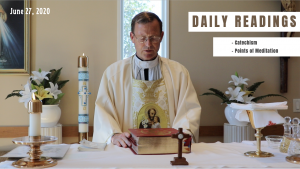
June 27 2020
Saturday of the Twelfth Week in Ordinary Time
Reading 1 LAM 2:2, 10-14, 18-19
The Lord has consumed without pity
all the dwellings of Jacob;
He has torn down in his anger
the fortresses of daughter Judah;
He has brought to the ground in dishonor
her king and her princes.
On the ground in silence sit
the old men of daughter Zion;
They strew dust on their heads
and gird themselves with sackcloth;
The maidens of Jerusalem
bow their heads to the ground.
Worn out from weeping are my eyes,
within me all is in ferment;
My gall is poured out on the ground
because of the downfall of the daughter of my people,
As child and infant faint away
in the open spaces of the town.
In vain they ask their mothers,
“Where is the grain?”
As they faint away like the wounded
in the streets of the city,
And breathe their last
in their mothers’ arms.
To what can I liken or compare you,
O daughter Jerusalem?
What example can I show you for your comfort,
virgin daughter Zion?
For great as the sea is your downfall;
who can heal you?
Your prophets had for you
false and specious visions;
They did not lay bare your guilt,
to avert your fate;
They beheld for you in vision
false and misleading portents.
Cry out to the Lord;
moan, O daughter Zion!
Let your tears flow like a torrent
day and night;
Let there be no respite for you,
no repose for your eyes.
Rise up, shrill in the night,
at the beginning of every watch;
Pour out your heart like water
in the presence of the Lord;
Lift up your hands to him
for the lives of your little ones
Who faint from hunger
at the corner of every street.
Responsorial Psalm 74:1B-2, 3-5, 6-7, 20-21
R. (19b) Lord, forget not the souls of your poor ones.
Why, O God, have you cast us off forever?
Why does your anger smolder against the sheep of your pasture?
Remember your flock which you built up of old,
the tribe you redeemed as your inheritance,
Mount Zion, where you took up your abode.
R. Lord, forget not the souls of your poor ones.
Turn your steps toward the utter ruins;
toward all the damage the enemy has done in the sanctuary.
Your foes roar triumphantly in your shrine;
they have set up their tokens of victory.
They are like men coming up with axes to a clump of trees.
R. Lord, forget not the souls of your poor ones.
With chisel and hammer they hack at all the paneling of the sanctuary.
They set your sanctuary on fire;
the place where your name abides they have razed and profaned.
R. Lord, forget not the souls of your poor ones.
Look to your covenant,
for the hiding places in the land and the plains are full of violence.
May the humble not retire in confusion;
may the afflicted and the poor praise your name.
R. Lord, forget not the souls of your poor ones.
Alleluia MT 8:17
R. Alleluia, alleluia.
Christ took away our infirmities
and bore our diseases.
R. Alleluia, alleluia.
Gospel MT 8: 5-17
When Jesus entered Capernaum,
a centurion approached him and appealed to him, saying,
“Lord, my servant is lying at home paralyzed, suffering dreadfully.”
He said to him, “I will come and cure him.”
The centurion said in reply,
“Lord, I am not worthy to have you enter under my roof;
only say the word and my servant will be healed.
For I too am a man subject to authority,
with soldiers subject to me.
And I say to one, ‘Go,’ and he goes;
and to another, ‘Come here,’ and he comes;
and to my slave, ‘Do this,’ and he does it.”
When Jesus heard this, he was amazed and said to those following him,
“Amen, I say to you, in no one in Israel have I found such faith.
I say to you, many will come from the east and the west,
and will recline with Abraham, Isaac, and Jacob
at the banquet in the Kingdom of heaven,
but the children of the Kingdom
will be driven out into the outer darkness,
where there will be wailing and grinding of teeth.”
And Jesus said to the centurion,
“You may go; as you have believed, let it be done for you.”
And at that very hour his servant was healed.
Jesus entered the house of Peter,
and saw his mother-in-law lying in bed with a fever.
He touched her hand, the fever left her,
and she rose and waited on him.
When it was evening, they brought him many
who were possessed by demons,
and he drove out the spirits by a word and cured all the sick,
to fulfill what had been said by Isaiah the prophet:
He took away our infirmities and bore our diseases.

Catechism of the Catholic Church
25 To conclude this Prologue, it is fitting to recall this pastoral principle stated by the Roman Catechism:
The whole concern of doctrine and its teaching must be directed to the love that never ends. Whether something is proposed for belief, for hope or for action, the love of our Lord must always be made accessible, so that anyone can see that all the works of perfect Christian virtue spring from love and have no other objective than to arrive at love.

“For greater things you were born.” (Ven. Mother Luisita)
SATURDAY, JUNE 27TH Mt. 8:5-17 “Lord, I am not worthy to have you enter under my roof; only say the word and my servant will be healed.”… And Jesus said: “Amen, I say to you, in no one in Israel have I found such faith.”
- In every Mass, the priest and the congregation together respond to the invitation, “Behold the Lamb of God” with these words: “Lord, I am not worthy that you should enter under my roof, but only say the word and my soul shall be healed.”
- What is this faith that Jesus praises in the centurion? This faith that we profess? It is total abandonment to God and His arrangements for our lives… requiring faith in His power and trust in His goodness!
On the Question of Abandonment to God… by Father Jacques Philippe
- Relative to the question of abandonment, it is useful to make an observation. In order that abandonment might be authentic and engender peace, it must be total. We must put everything, without exception, into the hands of God, not seeking any longer to manage or “to save” ourselves by our own means; not in the material domain, nor the emotional, nor the spiritual.
- We cannot divide human existence into various sectors: certain sectors where it would be legitimate to surrender ourselves to God with confidence and others where, on the contrary, we feel we must manage exclusively on our own.
- And one thing we know well: all reality that we have not surrendered to God, that we choose to manage by ourselves without giving carte blanche to God, will continue to make us more or less uneasy. The measure of our interior peace will be that of our abandonment, consequently our detachment.
- Abandonment inevitably requires an element of renunciation and it is this that is most difficult for us. We have a natural tendency to cling to a whole host of things: material goods, affections, desires, projects, etc. and it costs us terribly to let go of our grip, because we have the impression that we will lose ourselves in the process, that we will die.
- But that is why we must believe with all our hearts the words of Jesus, that law of “who loses gains,” which is so explicit in the Gospel: Whoever would save his life will lose it, while whoever loses his life for My sake will find it. (Matthew 16:25) He who accepts this death of detachment, of renunciation, finds the true life.
- The one who clings to something, who wishes to protect some domain in his life in order to manage it at his convenience without radically abandoning it into the hands of God, is making a very bad mistake: he devotes himself to unnecessary preoccupations and exposes himself to the gnawing sense of loss.
- By contrast, he who accepts to put everything into the hands of God, to allow Him to give and take according to His good pleasure, this individual finds an inexpressible peace and interior freedom. “Ah, if one only knew what one gains in renouncing all things!” (St. Therese of the Child Jesus). End of Reflection by Father Jacques Philippe
- Our good God created us out of love and desires to give us all that is good, if we would not hinder Him! Saint John of the Cross expresses this same truth in other terms: “All things were given to me from the moment when I no longer sought them.” If we detach ourselves from everything, and put everything into the hands of God, He will return them to us a hundredfold, from this day forward.
- Is my abandonment to you total, Lord? Or are there areas of my life that I still want to “manage”? Where do I invite you into my life, and where do I put up a “Do Not Enter” sign? Where do I experience interior peace in my life? Where am I uneasy? Who or what in my life would it “cost me terribly” to give up? Do I want true life in you, Jesus? Or am I afraid of what you will ask of me? Am I ready to radically abandon myself to you, allowing you to give and take as you choose?
- If only I knew that by giving up my life as I know it, I would gain new life in you of unsurpassed peace and joy. But I do know… deep inside me, I know… and that is why I am here every day in my holy hour. Jesus, you and you alone are the reason I am here… help me surrender more and more of myself to you every day.
“May it please Christ our Lord to grant us true humility and abnegation of will and judgment, so that we may deserve to begin to be His disciples. Amen” (St. Ignatius of Loyola)